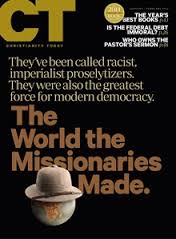I think I’m done with my ranting. I may not be done being snarky.
One of the points I made in my previous post was that Mark Twain, H.L. Mencken, social scientists from the 1970s, and Barbara Kingsolver did not really know a lot about missionaries.
But maybe that doesn’t matter. Maybe they were still correct. Maybe they picked up their information from others who knew the situation well. Maybe missionaries really were cultural imperialists who set back causes for freedom and human flourishing. After all, a lot of really intelligent people of goodwill in the American establishment viewed missionaries as cultural imperialists. And we certainly can find examples of missionaries behaving badly.
On the other hand, maybe Bob Woodberry is right.
Bob Woodberry says that “areas where Protestant missionaries had a significant presence in the past are on the average more economically developed today, with comparatively better health, lower infant mortality, lower corruption, greater literacy, higher educational attainment (especially for women), and more robust membership in nongovernmental associations.” And, oh yeah, they “heavily influenced the rise and spread of stable democracies around the world.”
Well.
That runs smack in the face of 100 years American establishment thinking about missionaries.
But who is this Bob Woodberry guy, anyway? And what does he know?
Bob Woodberry is a sociologist who recently published an article in the American Political Science Review (APSR), which is the top academic journal in political science. Some things to consider here: you can’t get published in this journal unless you can convince others that your work is top-notch. The APSR is also a journal that is not inclined to believe Woodberry’s argument. The editors of the APSR, in fact, were skeptical enough to ask him for more data and studies when he first submitted his study. He responded with 192 pages of supporting material. Woodberry has been at this research for fifteen years now and he uses historical analysis and very sophisticated quantitative methodology of social science, including “two-stage least-squares instrumental variable analysis.”
There you are. The “two-stage least-squares instrumental variable analysis” technique.
I have no idea what that is.

If you are one of the millions of people who are deeply fascinated by both missionaries and sophisticated social science methodology, you can pick up the May, 2012 copy of the APSR….
But I know this: his article in the APSR has won four academic awards.
In other words, he has convinced a lot of skeptics with his research. There is a fine article about him and his work in the Jan/Feb, 2014 issue of Christianity Today. It goes into more detail about how he reached his conclusions and some of the things he was up against as he tried to convince others of the validity of his research. I happen to know Bob and I’ve heard a story or two about scholars who got quite irate when they were confronted with his research. Other scholars, though, are sitting up and taking his work seriously.
Now, I should point out that these global developments did not happen simply by missionaries going out and preaching democracy. It is more complicated than that. Usually, missionaries were just trying to figure out how to spread the Gospel. Sometimes, in their falleness, they acted in undemocratic ways. Furthermore, many people who did not convert to Christianity still ended up embracing democracy and education and better health practices and more honest government and more robust economic practices. But according to Woodberry’s findings, the influence of missionaries played a key role in that whole process.
This is very important research. And it matters, because if Woodberry is correct, there are a lot of scholars (in the United States and around the world) who will need to reconsider the relationship between religion and the formation of democracy.
Woodberry is not alone in his scholarship on missionaries. A number of very good scholars in the last couple of decades have started to show that the 20th century establishment view of missionaries is flawed.
Of course, maybe Woodberry is wrong. After all, you can always believe H.L. Mencken, who did his research on missionaries by reading a few newspapers at his desk in Baltimore in the 1920s. Or Barbara Kingsolver, who not only read a book by Chinua Achebe but also one by David Livingstone.



Thank you for the reference. Very interesting. I would also like to read a solid work on how Wesley’s missionary activity within Great Britain and America impacted the development of representative democracy–and perhaps–impacted missionary activity elsewhere.
Randal:
I don’t have a solid grounding in the scholarship on Methodism and democracy in Britain, but I would recommend a book by Nathan Hatch called “The Democratization of American Christianity” and one by John Wigger, “Taking Heaven By Storm.” They address these issues, though their main goal is to explain Methodist and other religious movements in the Early Republic. And I know you’d like Wigger’s biography of Francis Asbury.
Pingback: Some Things Very Few People Know | The Circuit Reader